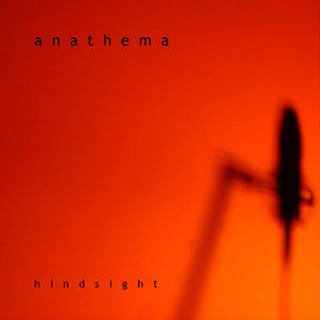"Building foundations, straining
Such good intentions, failing
Slowly we faltered from the line
slowly dissolving our time"
Such good intentions, failing
Slowly we faltered from the line
slowly dissolving our time"
Anathema's latest album, Distant Satellites (2014) is a darker and more minimalistic and electronic effort than its two precedessors, but not a radical stylistic departure. In fact, the album starts with two songs that are tied together musically and lyrically, just like Weather Systems (2012). While "The Lost Song" may not be as mind-blowing as "Untouchable", it's a damn good way to open the album. Part 1 has got a great rhythmic hook, while Part 2 plucks at your heartstrings with its beauty.
"Dusk (Dark Is Descending) is not a stand-out track, but also not as forgettable as the weak points of the last album; the opening guitar arpeggio is pretty cool. "Ariel" is similar to "The Lost Song, Part 2" in the sense that it's a piano ballad sung (for the most part) by Lee Douglas and shines with its melodies. "The Lost Song, Part 3" feels a little redundant: it has the same rhythm as the first part, but isn't nearly as catchy or emotionally powerful, which makes it a weird choice for first single. "Anathema", on the other hand, is a majestic piece of music that deserves to bear the name of the band. Vincent Cavanagh's high note at the end followed by his brother Danny's solo is one of the best moments in the band's discography, and that's a huge achievement for a band with such a long history.
"You're Not Alone" kicks off the second, more electronic half of Distant Satellites. The repetitive vocals irritated me initially, and it's hard not to think of this under 3 minutes long tune as a filler track, but I like the way the electronics have been combined with the rocking guitar riff. "Firelight" is an ambient track that doesn't work on its own, but it's a perfect introduction to the title-track. "Distant Satellites" is an absolute winner and soothing yet energetic - in a perfect world this song would be played in clubs all around the world! "Take Shelter" feels slightly underwhelming after the greatness of the previous song, but it's got beautiful strings and a nice atmosphere, making it a decent closer.
For me, Distant Satellites is a step up from Weather Systems: it's more dynamic and I dig the less heavily layered instrumentation and the darker vibe. It doesn't reach the brilliance of Anathema's best works, but the highlights are easily among the band's greatest songs, and the experimentation gives the record a shade of freshness, though there's plenty of familiarity in the first half. The album doesn't sound rushed, although it was done with a tight schedule. It'll be interesting to see whether Anathema will further explore the electronic path or if they have something different in store for us listeners!
Rating: 4/5







